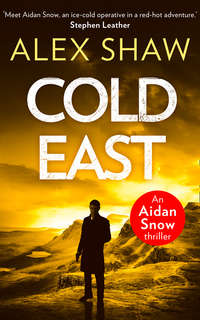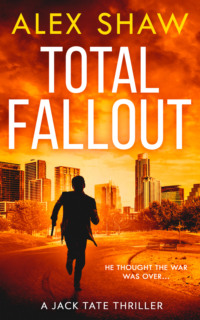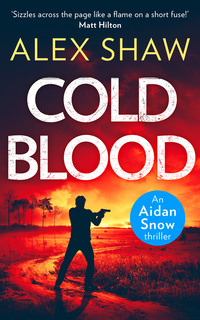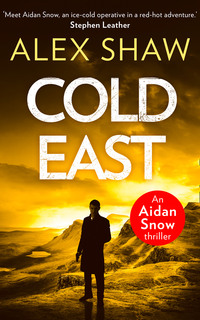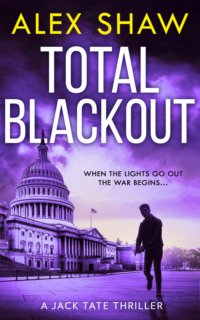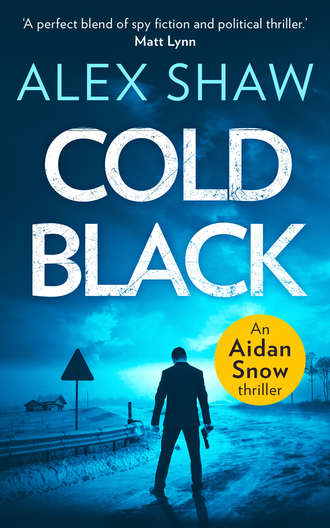
Полная версия
Cold Black
The Mercedes paused briefly as the heavy iron gates were drawn back, before continuing on into the grounds of the dacha. A light rain had started to fall, obscuring what was left of the weak daylight that attempted to penetrate the heavy tree cover.
Inside the dacha, Sverov stood by the fireplace, enjoying the warmth from the burning logs. Behind him on the wall, the eyes of the President seemed to peer from the large oil painting. It was August and the dacha felt unseasonably cool; a severe winter was expected for the people of Belarus. He heard his security team open the front door and straightened to receive his guest, the man from Moscow.
Gurov wasn’t a memorable man in terms of looks or stature. At just under six feet he was of average height, weight, and build. He had the look of a middle-level banker, except for his eyes, which were an unnerving dull grey that did little to hide the seriousness of the mind behind them.
Sverov extended his hand. ‘It is a privilege to finally make your acquaintance.’ The handshake was firm and he fought the urge to shiver. ‘Please take a seat.’
Gurov nodded and sat. ‘Director Sverov, thank you for agreeing to meet with me.’
‘My pleasure.’ There had been no choice; his President had been informed that this man was coming but Sverov saw no reason to be impolite. He sat opposite his visitor, a low table separating them. A pot of coffee sat in the middle.
‘It has been brought to the attention of my Premier Minister that your country has certain unpaid debts relating to the supply of gas.’
Sverov blinked but said nothing. This was not his area of expertise. The KGB had nothing to do with the Ministry of Energy.
Gurov continued. ‘It was necessary for RusGaz to terminate your supply. I am not here, however, to speak of unpaid bills or to collect payment. Please do not see me as an enforcer. I am here to deliver a suggestion, a proposal to you, which could write off the $500 million that your country owes mine. I have sent your President only the outline of the proposal. It is you, as Director of the KGB, who would implement it.’
‘I see.’ He didn’t. Who did this Russian think he was?
Gurov handed him a large envelope. ‘In here you will find detailed plans, methods of contact, and timelines.’
Incredulous, Sverov placed the contents on the table. ‘Forgive me, I do not quite understand. I report directly to the President of Belarus and it is from him that I take my orders.’
Gurov looked into the Belarusian’s eyes. ‘Once this meeting is over, call your President. Until then, accept what I say.’
Sverov folded his arms. He had nothing to lose. ‘Carry on.’
‘You have a man we need to use. Voloshin. Konstantin Andreyevich.’
Sverov’s eyes opened wide. Voloshin was one of the Belarusian KGB’s most closely guarded secrets. A Spetsnaz member trained to carry out international covert operations and acts of sabotage in his country’s name. A ‘deniable operative’ as the West liked to call them.
‘Do not be surprised that I know of this man, Director. Our paths have on occasion crossed. It is a tribute to you that I wish for this agent to be used.’
Sverov looked down at the papers. ‘You say that everything is laid out here?’
‘That is what I said. I do not have much time to brief you, Director, therefore I believe it would be advantageous if I were to speak while you listen.’
Sverov nodded, said nothing, and poured himself a cup of coffee.
Embassy of the Kingdom of Saudi Arabia, London, UK
Paddy Fox pulled at his shirt collar in an attempt to loosen it slightly. He hated being dressed like ‘a monkey’ and had always managed to have his top button undone when working for Dymex. Now, however, in the Royal Embassy of the Kingdom of Saudi Arabia, it had to be buttoned. Ironically, he was dressed as though he were attending a job interview. In the waiting room next to him sat DC Flynn, acting as a minder from Scotland Yard. Fox was under arrest for murder and attempted murder, even though there was a campaign in the media to have all charges dropped. The Sun had even nicknamed him the ‘Desert Fox’ for saving the Saudi princess. They had interviewed his neighbour Jim, who, without mentioning the Regiment, had implied that Fox had been a ‘special’ soldier.
On the advice of the Home Secretary, the press hadn’t been invited to the embassy a second time. There had been a group of ‘paps’ outside, but Fox’s minder and the embassy’s security detail had managed to shield his face. The media was desperate for a recent picture as the videophone footage had been pixelated too much for their liking. It was all fuss over nothing as far as he was concerned. He had done what he was trained to do: rescue hostages and neutralise X-rays. He hadn’t known at the time that the hostage was royalty and, frankly, it wasn’t important. He might have fought for ‘Queen and Country’ but he wasn’t particularly in awe of the first. Fox pulled at his shirt again – he was sure the police had bought him a size too small. As he hadn’t left the cells on bail, a shirt and suit had been ‘acquired’ for him.
The large double doors at the far end of the waiting room opened and a member of the embassy staff beckoned for him to follow. They turned a corner and walked down a long corridor which had various portraits hung on the walls: Saudi royals, camels, and racehorses. They reached another set of large double doors. The man knocked, opened them, and retreated back the way he had come.
Prince Umar stood and left his desk. He was dressed in an impeccably tailored dark-grey business suit, white shirt, and old school tie; his hair and perfectly kempt beard were jet black. He smiled broadly and stretched out his hand to take his visitor’s.
‘Mr Fox, I am extremely honoured to finally meet you.’ The handshake was firm.
‘Thank you for the invite, Your Highness.’
‘And this is?’ Umar looked at the minder.
‘DC Flynn, sir.’
Umar seemed puzzled but shook his hand nonetheless. ‘Please both take a seat.’
The three men crossed the room to an ornate fireplace where Umar sat in a large burgundy leather chair. Fox and Flynn sat on the matching settee opposite him. Umar clapped his hands and a servant brought in a tray of dates and a pot of black coffee. The two guests were given a cup each.
‘Mr Fox, on behalf of my brother Prince Fouad and the House of Saud, I want to thank you for rescuing my beloved niece, Princess Jinan. You are a man of honour and courage. You were unarmed yet you managed to stop four armed men and save Jinan. We will forever be indebted to you.’ He bowed his head, a mark of great respect for a Saudi royal.
Fox tried not to look too uncomfortable. Like most Regiment men he found it hard to take praise. ‘I just did what anyone would have done, Your Highness.’
‘Anyone with Special Forces training, Mr Fox.’ Umar smiled widely and showed off a set of perfect white teeth. ‘You were in the SAS, if I recall?’
Fox momentarily looked down. ‘I’m sorry, Your Highness, but I cannot confirm or deny your assumption.’
Umar moved his hand as if batting away a fly. ‘You do not have to.’
There was an awkward silence as the prince drank his coffee and his guests did likewise. An embassy staff member entered the room carrying something resting on his arms but covered by a ceremonial cloth. The prince stood abruptly. Fox and Flynn rose also. The man bowed, held out his arms, and Umar took off the sheet to reveal a large ceremonial sword. He held it up with both hands, took a step forward, and offered it to Fox. ‘On behalf of the House of Saud.’
‘Thank you, Your Highness.’ Fox took the sword into his own hands. It was heavier than it looked. The scabbard was ruby and emerald encrusted; the actual metal was a highly polished greyish white. Platinum.
Prince Umar continued to smile and picked up a booklet that had been lying on the table. ‘This is from my brother and me.’
The servant took the sword while Fox studied the booklet. It constituted details of a bank account in Zurich in the name of James Fox. He read on; the balance was two hundred thousand pounds. ‘Your Highness, I can’t accept this.’
Flynn looked over his shoulder. ‘It is the law, Your Highness. A criminal cannot legally profit from his crime.’
Fox felt his face burn. Flynn was a fool. That wasn’t what he’d meant.
Umar’s eyelids flickered and he slowly turned his head to look at Flynn. ‘What crime is that, officer?’
Flynn felt his own face flush. ‘Three counts of murder and one of attempted murder, Your Highness.’
Umar stared for several seconds at Flynn, who dared not move his eyes. ‘Mr Fox has not committed a crime in my country. Let me remind you, Mr Flynn, that you are in the Royal Embassy of the Kingdom of Saudi Arabia and, as such, on sovereign Saudi soil. If Mr Fox would like to, he could remain here and claim asylum, but I am afraid that you are no longer welcome.’
Inside Flynn bristled, but knew he was powerless. ‘But Your Highness… I…’
Umar held up his hand. ‘Officer Flynn, Mr Fox has committed no crime and he will not be prosecuted.’
Flynn had started to feel resentment. ‘I think that is up to the Crown Prosecution Service to decide.’
‘No. Mr Fox will not be prosecuted. Mr Fox, would you like to remain here?’
For a moment Fox couldn’t decide if the prince was joking or being serious. ‘Thank you for your kind offer but…’
Umar lowered his hand; his face had creased into an expression of reassurance. ‘Do not worry, Mr Fox. The CPS will not bring charges. And now I must take my leave of you.’ He held out his hand once more. ‘Mr Fox, we shall remain forever indebted to you.’
Umar ignored Flynn, turned, and moved towards his desk. The double doors opened behind them and both Englishmen were ushered out of the embassy, but not before Fox had been reunited with his sword. On the street outside, the ‘paps’ had multiplied and now a gang of twenty jostled to get photographs as Flynn, not too delicately, pushed Fox into the waiting unmarked Special Branch BMW 5 series.
‘Go,’ Flynn told the police driver. He turned to Fox, now making no attempt to hide his anger. ‘I suppose you found that funny?’
‘Hilarious.’
Before Flynn could reply his phone rang. He answered it and his jaw dropped. ‘He’s done what?’ In shock, Flynn stared blankly at the back of the driver’s seat for several seconds before closing the handset. ‘You’re free to go.’ Flynn looked like he was choking. ‘The CPS has dropped all charges.’
Fox started to laugh. ‘Drop me off at the nearest bank.’
Flynn spluttered, his face redder than ever. ‘You’re carrying an offensive weapon!’
‘So arrest me.’ Fox held out his hands, ready to be cuffed.
Flynn had no reply; he balled his fists as shock once again gave way to anger.
Chapter 3
Maidan Nezalejsnosti, Kyiv, Ukraine
Dudka stood with his dog on the edge of Maidan Nezalejsnosti and watched as Kyivites went about their daily routines of shopping, drinking, and falling in love. A hot August lunchtime on Kyiv’s Independence Square, and all those who could manage it were away on holiday or at their dachas. Those who stayed behind, however, enjoyed the sunshine.
Maidan Nezalejsnosti was the heart of the city and had been home to innumerable national celebrations. Every New Year’s Eve it was crammed with over a hundred thousand people waiting for the clock to strike midnight. Dudka had been at the festivities in London once, and been most unimpressed. Independence Day was another great celebration, as was Victory Day, the only hangover from the Soviet Union he enjoyed. In recent years, however, the square had been home to many political gatherings.
As the home of the Orange Revolution in 2004, well over two hundred thousand Ukrainians had camped and protested until they caused a rerun of the presidential election. One year later it became the home of those wishing to cause a rerun of the parliamentary elections. The ironic aspect to Dudka was that in the first event the then Prime Minister had illegally won the election while in the second he claimed he had illegally lost. And now? Well, now he was the President of Ukraine.
Such were the politics of Ukraine. In the past Dudka had tried to keep out of it all and had ‘supported’ the right person, regardless of his personal preferences. He had initially been appointed by Ukraine’s first President in 1992, and again kept his views to himself when promoted by his successor to the position of Deputy Head of the SBU, head of the Main Directorate for Combating Corruption and Organised Crime (Director). However his boss – he hated to think of him as that – Yuri Zlotnik, was a highly political beast.
Zlotnik’s position as head of the Security Service of Ukraine (SBU) was a parliamentary appointment, upon recommendation by the President. Directly under Zlotnik were deputies who were appointed, in turn, on his recommendation, again by the President of Ukraine. In normal circumstances this process would have resulted in a fair, impartial, and dedicated security service; however, in a government where the President and Prime Minister had been at war, problems arose.
Zlotnik was a compromise candidate, the President’s initial recommendation having been boycotted by the parliament, led by the then Prime Minister. It had been a bitter time as the two sides played a game of chess. Finally, as a ‘compromise’, Dudka took delight in remembering, Zlotnik had been confirmed as head of the SBU. Zlotnik then attempted to clean house by putting pressure on the President to appoint men close to him who were, no surprise to anyone, supporters of his sponsor, the Kremlin-favoured Prime Minister. Now, two years later, the former Prime Minister, originally a mechanic from the eastern city of Donetsk, had finally become the President of Ukraine. Zlotnik and his pro-Russian cronies were now cemented in power, the President’s men.
Zlotnik had decided to keep Dudka in place. Dudka was the oldest and most respected Director in the SBU, with years of distinguished service prior to that with the Soviet KGB. With age, however, Dudka had become less subtle and it was no secret that he wasn’t a fan of the new President and his men from Donetsk. If asked, Dudka no longer held back with his honest and sometimes blunt views.
Dudka reached down to stroke his dog, a grin on his face. He remembered how Zlotnik had turned red when, at an office party, Dudka had shared these views with him. Zlotnik had slammed his vodka glass down on the table and stormed off. As such, Dudka was, in essence, the enemy within. He was constantly butting heads with his boss but he had got results, more so than Zlotnik’s cronies. He was, as Zlotnik had told him to his face, ‘an oxymoron – a convenient inconvenience’.
Dudka turned and headed home, back up Karl Marx Street, or Horodetskoho Street as it had now been renamed, to his flat two minutes away on Zankovetskaya Street. Both streets, the first named after a political activist, the second after an apolitical actress, were busy with locals and tourists alike, shopping at the overpriced boutiques. No doubt his colleague and head of the SBU’s Anti-terrorist Centre, Pavel Utkin, would be looking at the summer crowds and worrying. He saw danger in everything.
Dudka and Utkin also did not see eye to eye. They were constantly colliding with each other over who had jurisdiction, his own Directorate for Combating Corruption and Organised Crime or Utkin’s Anti-terrorist Centre. Nowadays the distinction wasn’t clear; organised crime seemed to be increasingly carried out to fund terrorism. For his part, Dudka wanted things to be smooth. It was Utkin, the younger man by twenty years, with an eye on the top job, who wanted to take over. The problem was that Utkin, too, was one of the President’s men.
Dudka found himself working with the ‘Bandits from Donetsk’ – as the press, not he, had labelled them. The consensus had been that January’s presidential elections would oust the bandits. Consensus had been wrong. The election had given them the most powerful position of all, that of President of Ukraine.
Dudka reached his building, entered the lift, and rose to the third floor. His official lunch hour over, he settled his dog back down and left for his office. He would walk, not bothering to use his car, an advantage of living in the very heart of the city. He’d be there within sixteen minutes, taking a circuitous route to bypass the crowds on the central square. He put his tie and jacket back on, both bought from the state-owned central store, Tzum, and shut the front door.
Since secession from the Soviet Union, Ukraine had changed greatly and yet not at all, he mused as he journeyed back down Zankovetskaya. The shops lining the capital’s streets were full of expensive imported goods and the city bustled with a tenfold increase in traffic, but beneath the surface many of the same people were running the country. They might have renounced communism but they were still Soviet in mentality. The faces hadn’t changed either. It was the new generation that would really change the place and he feared that, at seventy-two, he wouldn’t live long enough to see his dear country become fully grown. His day had gone and all he could do now was ensure his homeland didn’t implode before he could hand it over. His own protégé, Blazhevich, was one of the people who would shape the future of the SBU. He was young, not yet thirty-five, and untarnished by the Soviet past. He had first proved himself to be a worthy officer two years before, when, working together, they had halted an international arms trading network. If Dudka had to name one good man in the nest of vipers that the SBU had become, it would be Vitaly Blazhevich.
Dudka crossed Kyiv’s main boulevard, Khreshatik, by means of the underpass and puffed as he walked up Prorizna Street. The hills kept him trim. He thought of himself as solid. Certainly not fat. Yet his late wife, the ballerina, had always been putting him on a diet! Two American businessmen passed him walking downhill. One was gesticulating to the other, who was nodding and looking serious. Dudka took this in his stride. Fifteen years ago all foreigners would have been stared at, but today, although still undiscovered by international tourism, more and more foreign businessmen were in Ukraine.
The criminal element, too, seemed to understand the value of ‘foreign business diversity’. In the early days his caseload had been heavy with instances of attempted or actual extortion on and against foreign business interests. Now these were few and far between as the criminals themselves tried to expand abroad. This, however, caused new headaches as he laboured to improve ties with foreign agencies and Interpol. But Dudka’s current caseload was surprisingly light. Not much had happened in the last two months; perhaps the bandits were watching and waiting for the political situation to settle before deciding on the most profitable type of ‘business’? Or perhaps, he mused once more, they, too, were just on holiday?
SIS Headquarters, Vauxhall Cross, London, UK
Snow climbed the stairs to stretch his thigh muscles. Sitting for too long in traffic, his left leg had become stiff. He reached Patchem’s floor, his thighs gently warmed, crossed the open-plan section, and pushed the door that led to the reception area for the ‘Soviet Desk’, as it was still affectionately called by the longer-serving officers. Patchem’s overly serious secretary nodded that he should enter. Patchem gestured for Snow to sit. Through the large thick glass window, the Thames below reflected the mid-morning sun.
‘Paddy Fox.’ Patchem didn’t waste his words.
Snow nodded. The dramatic rescue footage, which some overexcited journalists were saying was the most sensational since the Iranian Embassy siege, had made Fox something of a media sensation. The royal endorsement of Umar Al Kabir had only added to this. It had been leaked that Fox was an SAS veteran of both Iraq wars. The media, who liked nothing more than a real-life ‘action hero’, clamoured for more information and pictures like a pack of feral dogs. Even Britain’s most well-known former SAS member turned author had commented on Fox’s actions in his newspaper column.
‘I know you were in different squadrons, generations, but you must have met over the years?’
‘We have met.’
Snow didn’t mention the freezing nights spent in a hedgerow in South Armagh’s ‘Bandit Country’ while on attachment to ‘The Det’, the Royal Ulster Constabulary’s intelligence unit. The pair of them had been deployed to relay information on a suspected new IRA cell.
‘What do you think of him?’ Patchem’s bright-blue eyes burned into Snow’s. ‘Liked by most, respected by all, I assume?’ Patchem continued, with mild sarcasm.
‘Yes.’ What was he getting at?
‘But in possession of a short temper. He wouldn’t get past the psych test in today’s Regiment selection. Six weren’t interested in him either, even though he spoke Arabic. Here, have a look.’ Patchem removed a buff-coloured file from his briefcase on the table in front of him.
Snow took the file and opened it. It was a censored version of the military record of one James Celtic Fox. A boy soldier in the Gordon Highlanders, he had passed selection at the age of twenty-one and into B Squadron 22nd Regiment Special Air Service. Mobility Troop. Specialist: demolition. The file listed some of the campaigns he had undertaken, many not known outside the confines of Whitehall and Stirling Lines. Large areas had been blacked out when the file had been photocopied.
‘Fox made corporal in the Highlanders but was demoted back to private.’
Snow looked up from the page. ‘Oh?’
Patchem spoke, matter-of-fact. ‘He threw his sergeant major out of a window.’
Snow wasn’t surprised; he’d believe anything of Paddy.
‘Evidently he found the bugger in bed with his wife. Luckily for both men the room was on the first floor! So, to business.’ Patchem held his hand out for Snow to return the file. ‘As the media has been so keen to broadcast to the world, an unknown terrorist organisation attempted to abduct the daughter of a member of the Saudi royal family. Fox stopped them, shot three of the kidnappers, and rescued the girl. Unfortunately he also seriously wounded a bystander – you’ll have seen all this on TV’
Snow nodded.
‘Well, this person, the “innocent passer-by”, happened to be having an affair with Fox’s second wife.’
‘Quite a coincidence.’
‘That’s exactly what the CPS thought. However, it has been decided, though not made public yet, that he’s not to be charged with attempted murder. It turns out the Saudis have some friends in very high places. These people “persuaded” the Home Secretary to drop all charges against Fox.’
It would be put down to the ‘special relationship’ between Saudi and the UK, which in reality had far more to do with arms contracts. Patchem had heard that Saudi Arabia had threatened to nullify the latest contract if Fox were prosecuted. Al Kabir was the Saudi signatory.
‘What’s more, Fouad Al Kabir is to offer Fox a position in Riyadh, as head of security, to show his gratitude. What I want you to do is persuade Fox to take it.’ Patchem pressed a button on his keyboard and an image was projected on the blank, light-blue wall behind Snow’s head. ‘Recognise him?’
Snow swivelled in his chair and saw an image of a dead body. The picture zoomed in and Snow recognised the man. A second image, this one a still from Snow’s mobile video footage taken in Harley Street, appeared next to the face.
‘The same person.’
‘I agree. He has yet to be identified, but this is one of the abductors Fox neutralised. The attack on Durrani and the abduction are linked.’
Snow frowned. ‘Are you saying that Dr Durrani had links or dealings with terrorists?’
‘Absolutely not. He had a higher security clearance than you. He’d worked for us for years and was fully vetted. He trained in the UK but was a Pashtun, originally from Quetta. His family came to the UK when the Soviets invaded neighbouring Afghanistan. Due to his contact with us, we monitored all his patients. We know they included members of the Saudi royal family. With regard to whoever perpetrated these two acts, to be candid, we have no leads whatsoever. Furthermore, the media and the PM are asking “why”. The last thing we need is someone putting the desert wind up the Saudis.’ Patchem half-smiled at his play on words; it hid his sadness at the loss of a colleague. ‘If Fox takes this job it would also get him well and truly away from the media. Whitehall are very keen to kill the story. Everything you need to know is in here. Any questions?’




